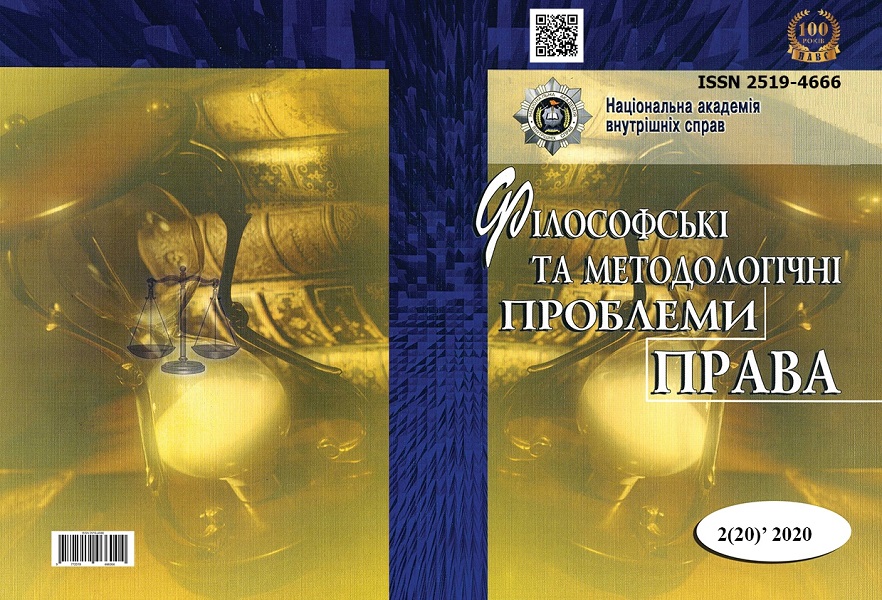Logical-Semantic Aspect of Building Investigation Strategies
Abstract
The purpose of the article consists in revealing of those semantic foundations of investigative logic, basing on which it could be possible to define the conditions of relevant application of different logical-heuristic and forensic methods, and also to outline a principal model of logical rationalization of approaches to investigative strategy building. Methodology. The method of comparative analysis is used for the exposure of sources of basic contradictions, traced in the most widespread methodological approaches to decision of the examined problem in modern literature. Based on the method of semantic analysis, the conditions of effectiveness of various logical and methodological tools in the field of investigative activities are determined. The methods of logical modeling, generalization and formalization are used during the elaboration of logical heuristic strategies and algorithms of investigative optimization. Scientific novelty. There’s been studied the logical and semantic foundations of the relevant application of heuristic search methods in the construction of investigation strategies. Besides, a logical model of optimization of such strategies is proposed, which is based on the mechanisms of mutual coordination of synchronic and diachronic aspects of the analysis of reproduced events. Conclusions. The construction of an effective investigation strategy involves, first of all, the development of a general model of organization of heuristic search activities. Such a model should be understood not as a “universal tool” that eliminates the need for other general and special methods, but as a methodological foundation of their system-coordinated application. The logic of rationalization of investigative actions, which is the basis of the mentioned model, should be focused on achieving the functional unity of its synchronic and diachronic aspects. The effective means of optimizing strategies and methods of investigation are connected with a combinational approach that provides a significant and timely narrowing of the search range, regarding the conditions of compatibility and achievability of the analyzed situations in the context of the available evidence.
Keywords: investigative methodology; semantic bases of logical methods; logic of investigation; investigative strategy; logical analysis of versions; synchronic and diachronic aspects of search analysis; logical criteria of provability; technology of logical arrangement of investigation.
Downloads
References
Dagan H. The New Legal Realism and The Realist View of Law. Law & Social Inquiry. 2018. Vol. 43. Issue 02.
P. 528–553. doi: https://doi.org/10.1111/lsi.12319.
Enoch D., Fisher T., Spectre L. Statistical evidence, sensitivity and the legal value of knowledge. Philosophy and Public Affairs. 2012. Vol. 40. No 3. Р. 197–224.
Fahsing I. The Making of an Expert Detective: Thinking and Deciding in Criminal Investigations. Univ. of Gothenburg, 2016. 108 p.
Girod R. Logical Investigative Methods: Critical Thinking and Reasoning for Successful Investigations. N.Y. : CRC Press, 2015. 270 p.
Гвоздік О. Критерії достатності доказів. Філософські та методологічні проблеми права. 2019. № 2 (18). С. 63–70. doi: https://doi.org/10.33270/02191802.63.
Гвоздік О. Логічні засоби оптимізації слідчої діяльності. Філософські та методологічні проблеми права. 2020. № 1 (19). С. 109–117. doi: https://doi.org/10.33270/0220190.
Колодіна А. Екстраполяція принципів окремих методик розслідування у слідчу діяльність. Підприємництво, господарство і право. 2019. № 11. С. 355–361. (Cерія «Криміналістика»). doi: https://doi.org/10.32849/2663-5313/2019.11.61.
McCann M. Preface to The New Legal Realism, Volumes I and II. Cambridge University Press, 2016. doi: https://doi.org/10.1017/CBO9781139683432.001.
Palcu P., Morostes A. Profiling as a logical form of reasoning in order to solve controversial circumstances on the crime scene. Journal of legal studies. 2016. Vol. 17. No. 31. P. 46–57. doi: https://doi.org/10.1515/jles-2016-0005.
Pardo M. S. The paradoxes of legal proof: A critical guide. Boston University Law Review. 2019. Vol. 99:233.
P. 233–290. doi: https://ssrn.com/abstract=3293023.
Petherick W. Logic and Reasoning in Crime Analysis. Applied Crime Analysis. 2015. P. 14–38. doi: 10.1016/B978-0-323-29460-7.00002-8.
Smith M. When does evidence suffice for conviction? Mind. 2018. Vol. 127. Issue 508. P. 1193–1218.
Старушкевич А. Криміналістичне мислення: поняття та зміст. Міжнародний юридичний вісник: актуальні проблеми сучасності (теорія та практика). 2018. Вип. 1–2 (10–11) С. 243–249. URL: http://nbuv.gov.ua/ UJRN/muvnudp_2018_1-2_41.
Тягло А. О стандартах доказательства. Форум права. 2018. № 1. С. 88–94. doi: http://doi.org/10.5281/zenodo.1239007.
Журавель В. Криміналістичні методики: сучасні наукові концепції : монографія. Харків : Апостиль, 2012. 304 с.
Abstract views: 686 PDF Downloads: 255
Copyright (c) 2021 Philosophical and Methodological Problems of Law

This work is licensed under a Creative Commons Attribution-NonCommercial-NoDerivatives 4.0 International License.
- Authors reserve the right to authorship of their own work and transfer to the magazine the right of the first publication of this work under the terms of the Creative Commons Attribution License, which allows other persons to freely distribute published work with mandatory reference to authors of the original work and the first publication of an article in this magazine.
- Authors have the right to enter into separate additional agreements on non-exclusive dissemination of the work in the form in which it was published in the journal (for example, to post an article in the institution's repository or to publish as part of a monograph), provided that the link to the first publication of the work in this journal is maintained.
- The journal's policy allows and encourages the posting of articles by authors on the Internet (for example, in electronic storehouses of institutions or on personal websites), both before the submission of this manuscript to the editorial office and during its editorial processing, as this contributes to the creation of a productive scientific discussion and positively affects the efficiency and dynamics of citing the published work.




